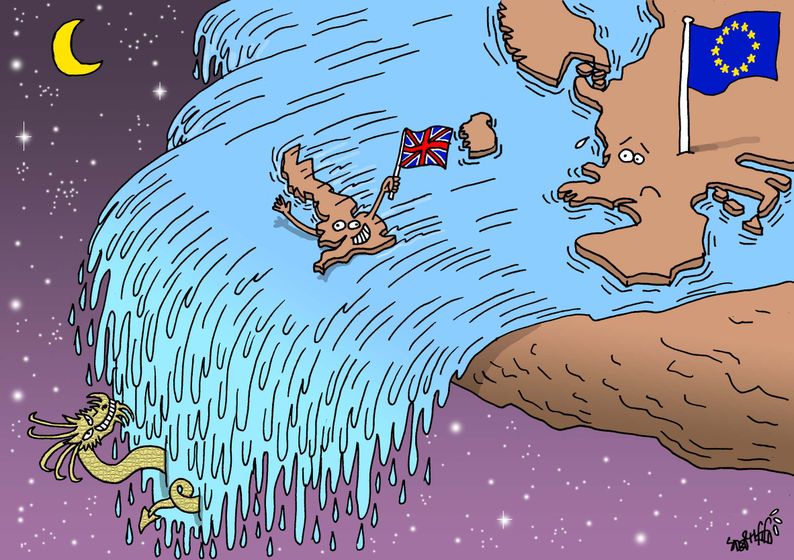Is Brexit the end of Democracy – Esme Peters
*disclaimer – this was written on the 11th September 2019
“The end of parliamentary democracy” – Dominic Grieve
When sitting down to write this article I thought what can I write that will still be true on Friday when the bubble publishes (it is Wednesday at this point). But that is the nature of Brexit, checking the news throughout the day at the moment brings a different headline each hour. For example today at 7:24 Tom Watson made headlines urging Labour to ‘unambiguously and unequivocally back remain’ whereas at 18:24 Jeremy Corbyn made headlines completely rejecting the idea. The only way I find it possible to keep up is to keep up with everything is through the Guardian’s live feed (although I do realise the guardian is not to everyones taste – BBC also have a live feed).
But this article will hopefully still stand on Friday as it is going to explore long term impacts, although with the Scottish courts ruling that Boris Johnson proroguing parliament was unlawful and Operation Yellowhammer (the governments contingency plan for a no deal Brexit) just published to the public who knows?
One of my favourite articles I have read recently was a comparison of Ministers reactions on the suspension of parliament;
Matt Hancock
“Prorogation would mean the end of the Conservative party” – 6 June
“Morning, how are you? Sorry. How are you?” – Thursday
And while it did amuse me as to the extent to which current ministers are utterly egotistical and career driven it did reflect a wider point – democracy is not safe when those who state to have devoted their life to protect it, aren’t willing to.
Sajid Javid
“You don’t deliver on democracy by trashing democracy” – 16 June
“No comment” – Thursday
To make this an easier decision as to whether democracy is indeed over, democracy must first be defined. As the Cambridge dictionary defines it democracy is ‘the belief in freedom and equality between people, or a system of government based on this belief, in which power is either held by elected representatives or directly by the people themselves’. In the UK we are a parliamentary democracy and therefore we have elected representatives (MPs) who make decisions on our behalf, everyone over 18 has a right to vote for this representative. Hence why the suspension of Parliament has caused such controversy – if our elected representatives can’t sit during a time of ‘national crisis’ then how can they protect the constituents they were elected to represent?
Argument in favour of this prorogation take the stance that the public have voted to leave the EU (51.9% of the population voted to leave) and therefore nothing should interfere in this. Now while, as many MPs have pointed out, the public voted leave on the basis they were promised a deal (which they were told by Liam Fox would be the ‘easiest in human history’) many members of the public do actually support a no deal. A recent YouGov poll suggested 24% of the British population would regard a no deal as a ‘success’. I realise this may be a bit of a mind boggle of a paragraph but that is almost the point – the question about whether democracy is dead lies almost entirely in your views of Brexit.
Take the Spectator versus the New Statesman for example. The Spectator is a strongly leave, right wing magazine and their opinion is, ‘Stopping Brexit means stopping democracy. If we kill Brexit, we kill democracy itself’. Whereas the New Statesman a left wing, remain magazine took the view, ‘Democracy is the will of the people, but what if the people have little clue as to what they are doing’ the article then explored the extent to which people were misinformed on important matters. A key example from the article being immigration, statistics from the Ipsos Mori polling firm discovered that Leave voters believed that EU immigrants comprise 20 per cent of the UK’s population, Remain voters estimated 10 per cent. The actual figure is about 5 per cent. This figure has to be balanced against the reality that migrants have not settled q2uniformly across the UK.
For democracy to function properly the public must be properly informed of facts and on that basis Brexit was a democratically flawed concept from the beginning. Promises versus the reality have been a real point of controversy over Brexit. For example, promise: a raft of new trade deals would be ready on March 29th 2019. Reality: Britain has won the right to negotiate deals with third countries during the transition period (not before) but they cannot be implemented until after December 2020. For more of these example just google Brexit lies (GQ have done an A-Z of them), it would probably make me laugh if it didn’t worry/scare/panic/disturb me.
One of the problems I see with Brexit is that it is such a complex issue; arguably one too complex to put to the public in a binary and overly simplistic yes/no referendum. People have argued it was too much of a fundamental issue not to go to the public but was a referendum the right way to seek the public’s opinion? The wrangling of the last three years clearly show that in complex political decisions, such as Brexit, the stakes are too high to get it wrong. To cast a smart vote, people would’ve needed significant ‘social scientific knowledge’. They would need to know about the economics and sociology of trade and immigration, the politics of centralised regulation, and the history of nationalist movements. But there is no reason to presume even a tenth of the UK’s population enough of a grip which would be needed to evaluate Brexit. As the super cheerful New Statesman article put it, ‘Democracy is the will of the people, but the people usually have little clue what they are doing’.
On the awareness I know I am very pro remain and think Boris Johnson is the epitome of a walking disaster I am now going to try and argue with myself and say that Brexit is not a democratic disaster. Yep, no, can’t do it…
















Post Comment
You must be logged in to post a comment.